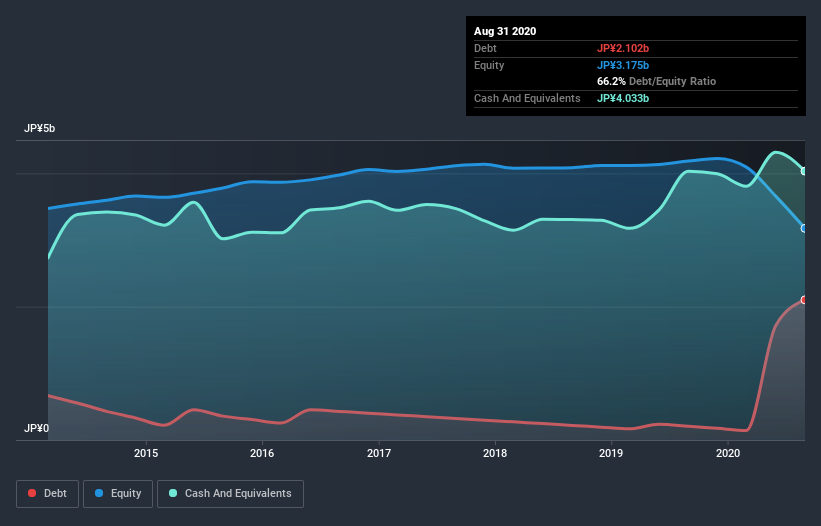
The external fund manager backed by Berkshire Hathaway's Charlie Munger, Li Lu, makes no bones about it when he says 'The biggest investment risk is not the volatility of prices, but whether you will suffer a permanent loss of capital.' So it might be obvious that you need to consider debt, when you think about how risky any given stock is, because too much debt can sink a company. Importantly, Life Foods Co., Ltd. (TYO:3065) does carry debt. But should shareholders be worried about its use of debt?
Why Does Debt Bring Risk?
Generally speaking, debt only becomes a real problem when a company can't easily pay it off, either by raising capital or with its own cash flow. If things get really bad, the lenders can take control of the business. However, a more usual (but still expensive) situation is where a company must dilute shareholders at a cheap share price simply to get debt under control. Of course, debt can be an important tool in businesses, particularly capital heavy businesses. When we examine debt levels, we first consider both cash and debt levels, together.
Check out our latest analysis for Life Foods
What Is Life Foods's Net Debt?
The image below, which you can click on for greater detail, shows that at August 2020 Life Foods had debt of JP¥2.10b, up from JP¥206.0m in one year. But it also has JP¥4.03b in cash to offset that, meaning it has JP¥1.93b net cash.

How Strong Is Life Foods's Balance Sheet?
The latest balance sheet data shows that Life Foods had liabilities of JP¥1.54b due within a year, and liabilities of JP¥2.47b falling due after that. Offsetting this, it had JP¥4.03b in cash and JP¥22.0m in receivables that were due within 12 months. So these liquid assets roughly match the total liabilities.
This state of affairs indicates that Life Foods's balance sheet looks quite solid, as its total liabilities are just about equal to its liquid assets. So it's very unlikely that the JP¥6.26b company is short on cash, but still worth keeping an eye on the balance sheet. Simply put, the fact that Life Foods has more cash than debt is arguably a good indication that it can manage its debt safely. There's no doubt that we learn most about debt from the balance sheet. But you can't view debt in total isolation; since Life Foods will need earnings to service that debt. So if you're keen to discover more about its earnings, it might be worth checking out this graph of its long term earnings trend.
In the last year Life Foods had a loss before interest and tax, and actually shrunk its revenue by 18%, to JP¥11b. That's not what we would hope to see.
So How Risky Is Life Foods?
By their very nature companies that are losing money are more risky than those with a long history of profitability. And in the last year Life Foods had an earnings before interest and tax (EBIT) loss, truth be told. And over the same period it saw negative free cash outflow of JP¥1.8b and booked a JP¥977m accounting loss. With only JP¥1.93b on the balance sheet, it would appear that its going to need to raise capital again soon. Overall, its balance sheet doesn't seem overly risky, at the moment, but we're always cautious until we see the positive free cash flow. There's no doubt that we learn most about debt from the balance sheet. However, not all investment risk resides within the balance sheet - far from it. Take risks, for example - Life Foods has 3 warning signs (and 2 which are a bit concerning) we think you should know about.
When all is said and done, sometimes its easier to focus on companies that don't even need debt. Readers can access a list of growth stocks with zero net debt 100% free, right now.
When trading Life Foods or any other investment, use the platform considered by many to be the Professional's Gateway to the Worlds Market, Interactive Brokers. You get the lowest-cost* trading on stocks, options, futures, forex, bonds and funds worldwide from a single integrated account. Promoted
New: AI Stock Screener & Alerts
Our new AI Stock Screener scans the market every day to uncover opportunities.
• Dividend Powerhouses (3%+ Yield)
• Undervalued Small Caps with Insider Buying
• High growth Tech and AI Companies
Or build your own from over 50 metrics.
This article by Simply Wall St is general in nature. It does not constitute a recommendation to buy or sell any stock, and does not take account of your objectives, or your financial situation. We aim to bring you long-term focused analysis driven by fundamental data. Note that our analysis may not factor in the latest price-sensitive company announcements or qualitative material. Simply Wall St has no position in any stocks mentioned.
*Interactive Brokers Rated Lowest Cost Broker by StockBrokers.com Annual Online Review 2020
Have feedback on this article? Concerned about the content? Get in touch with us directly. Alternatively, email editorial-team@simplywallst.com.
About TSE:3065
Excellent balance sheet and good value.
Market Insights
Community Narratives



